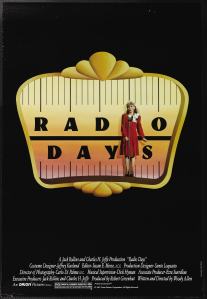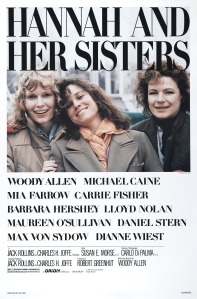Director: Woody Allen
Starring: Mia Farrow, Seth Green, Julie Kavner, Dianne Wiest, Michael Tucker, Danny Aiello, Tony Roberts, Jeff Daniels, Seth Green, Woody Allen (narrator)
Since the invention of the television, and other visual and auditory electronic devices, the radio, while it hasn’t been phased out, has taken on a decidedly smaller role in our lives from the one it used to play. That, in essence, is one of the main driving points of “Radio Days,” which is first and foremost a movie about nostalgia for a bygone era. Having been born during the television age, I don’t think that this movie was made with my generation (or the one after mine) in mind. Most of the vignettes are memories the main character associates with radio broadcasts of significant value which he remembers hearing as a child. Some of their real-life counterparts I know of from anecdotes I’ve heard, but I was decades away from being born when they were originally broadcast. I do like it when the TV airs reruns of older shows, or when the radio plays the songs that were hits when my parents were in their teens/early 20’s. As such, this too is not out of a sense of nostalgia, instead it is out of good taste. Same reason I’ve been on this Woody Allen marathon as of late, of which “Radio Days” is the culmination.
As the narrator, director Woody Allen provides the voice of the adult version of the main character for most of the vignettes, a redheaded Jewish boy named Joe (Seth Green) growing up in late 1930’s/early 40’s New York. One of these includes his quest to obtain a secret decoder ring, something to which most young boys can relate. We all tried to pester our parents for that toy we just HAD to have; some of us were just more persuasive than others. Joe’s parents (Julie Kavner, Michael Tucker) are not so easily persuaded, and as the adult Joe glumly reports, he never got that ring. My, how did he ever survive without it?
Occasionally, the radio holds onto the attention of our cast with startling news broadcasts… most of which are genuine. One instance in which the news is fantasy is the infamous “War of the Worlds” broadcast, interrupting an otherwise lovely evening for Joe’s Aunt Bea (Dianne Wiest), revealing her date to be a total coward. The parts about World War II are presented seriously, as well they should be. Maybe my favorite sequence, though, ends up being the news of the little girl trapped down inside a well. This is an otherwise grim situation which is reported so dramatically that it results in that special kind of uncomfortable guffaw. You know you shouldn’t laugh, but you can’t help it.
The parts of “Radio Days” I’m not so fond of are those which revolve around the character of Sally White (Mia Farrow). Whether she’s getting trapped on a rooftop, or whether we’re following her attempts at becoming a radio star, I just want her to go away. It’s that voice. That horrible, godawful voice! Oh, Sally sings just fine, but any time she speaks, that high-pitched, ear-splitting sound emanating from her mouth makes me long for someone to scratch their nails on a chalkboard. Based on her stellar performances in “Rosemary’s Baby,” “Broadway Danny Rose” and “The Purple Rose of Cairo,” I know full well that Mia Farrow is capable of much better things, which is what makes the character of Sally White that much more of a disappointment.
Absolutely not disappointing is the collection of actors with whom Allen has previously worked that make their return here. In addition to Mia Farrow, Dianne Wiest and Julie Kavner, “Radio Days” also features Tony Roberts, Wallace Shawn, Danny Aiello, Jeff Daniels and Diane Keaton. I especially appreciate the return of Keaton, even if it is for just the one song. Wallace Shawn is amusing as the radio actor who provides the voice of the macho superhero, the Masked Avenger, a role he could not have played on television.
The whole point to “Radio Days,” as I have said, is nostalgia for a bygone era. Because I do not share in that nostalgia, my interests in the movie are in whether it is funny (which it is sparingly) and whether the story is interesting. Because there is no one cohesive tale but a series of short happenings, that’s a little harder to grade. Overall, color me underwhelmed, which is a sad thing to say given that this is the film with which I end my Woody Allen marathon. Nostalgia, at its core, is all about looking back at fond memories. The movie series I’m about to switch gears back to (given that tomorrow is another “Friday the 13th”) is nowhere as sophisticated as a Woody Allen movie, but it does hold that certain fondness to which I am referring. I’ll always remember exactly how old I was when I saw them for the first time. I don’t know if I’ll be able to say the same of “Radio Days.”

